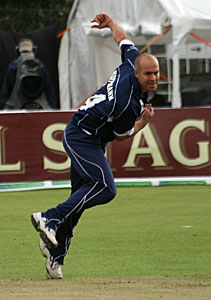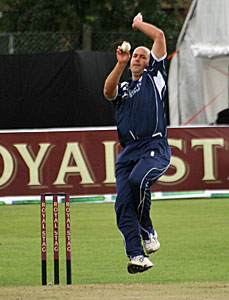 Paul Hoffmann might have been one Scottish cricket's accidental heroes. But the gusto with which the Australian swapped Queensland for Uddingston in 1997 and turned an initial holiday north of the Border into a 16-year love affair with Scotland helped explain why this larger-than-life character became one of the most popular figures on the scene. All of which makes it doubly disappointing that "Hoffy" should have found himself on the dole during the winter, after losing his full-time groundsman's role at Bothwell Castle Policies, and why he and his wife, Lynette (and their three-year-old son, Hayden), are all heading off Down Under in March, to start work on a new café/bakery venture.
Paul Hoffmann might have been one Scottish cricket's accidental heroes. But the gusto with which the Australian swapped Queensland for Uddingston in 1997 and turned an initial holiday north of the Border into a 16-year love affair with Scotland helped explain why this larger-than-life character became one of the most popular figures on the scene. All of which makes it doubly disappointing that "Hoffy" should have found himself on the dole during the winter, after losing his full-time groundsman's role at Bothwell Castle Policies, and why he and his wife, Lynette (and their three-year-old son, Hayden), are all heading off Down Under in March, to start work on a new café/bakery venture.
Those of us who have had dealings with Hoffmann, an individual who represented his adopted country 119 times, in addition to becoming the most prolific bowler in the history of the SNCL, and helping his club to secure three Scottish Cup triumphs, will appreciate the appeal that running a café might hold for the 43-year-old; this, after all, is the fellow who could hunt down tea cakes and caramel wafers with the same passion he demonstrated against the best opponents. Yet, for all his natural joie de vivre, there was an understandable tristesse, lurking under the surface, about the circumstances which have conspired to send Hoffmann back to his native Rockhampton.
"It has been a frustrating winter, with Lynette having to work non-stop, while I searched for whatever jobs I could find, without much success, but we have to look at the bigger picture and I have a family to think about these days, so a part-time role at Uddingston wasn't an option," said Hoffmann. "We weren't sure we could afford to move halfway across the world, but we have made the arrangements and, now, it's all systems go.
 "Of course, I will be sad to be leaving Scotland, although I never imagined I would be here for as long as I have been. When I first arrived, in 1997, I was spending half the time here and half in Australia, but gradually, I fell in love with this country, then I met Lynette and gained the chance to play for Scotland. Things sort of mushroomed, once I received a call from [the governing body's former director of cricket] Jim Love and, a few weeks later, I was taking a five-for against the England Amateurs at Arundel. I never planned any of it, but I have absolutely no regrets about how it unfolded."
"Of course, I will be sad to be leaving Scotland, although I never imagined I would be here for as long as I have been. When I first arrived, in 1997, I was spending half the time here and half in Australia, but gradually, I fell in love with this country, then I met Lynette and gained the chance to play for Scotland. Things sort of mushroomed, once I received a call from [the governing body's former director of cricket] Jim Love and, a few weeks later, I was taking a five-for against the England Amateurs at Arundel. I never planned any of it, but I have absolutely no regrets about how it unfolded."
It wasn't a coincidence that Hoffmann's entrance happened at the same time as the most prosperous period in Scotland's history. By 2003, he had developed into a genuinely dangerous opponent, both penetrative and parsimonious on the local and international circuits. "It was huge for the Saltires to get into the Totesport League, because the boys needed more high-profile matches and we came out the blocks, with wins over Durham, Somerset and Lancashire in our first four games, and a few people in the team began thinking: "Hang on, maybe these county lads aren't as good as they're cracked out to be.
"In the end, most of these sides gained their revenge, but if you look back 10 years, it was definitely a few notches up. Rahul Dravid played for Scotland, we thrashed Ireland in the final of the World Cup qualifying tournament in 2005, and we had plenty of boys, from Dougie Brown to Gavin Hamilton, Ryan Watson to Craig Wright, and Colin Smith to Majid Haq, who were capable of giving anybody a run for their money.
"The trouble was there weren't many youngsters coming behind us. I'm honest enough to admit that by the 2007 World Cup, some of us had grown a bit long in the tooth, and that was a watershed competition, because, whereas the Irish beat Pakistan and have kicked on ever since, we lost all our fixtures and the profile we had built up just vanished. I don't know why Kyle Coetzer wasn't picked for the West Indies, but it was an ageing squad, and we have struggled to regain any sustained momentum in the last five years."
 Hoffmann once locked horns in the Australian environs with such luminaries as Adam Gilchrist, Ricky Ponting and Glenn McGrath, but has never harboured any illusions about the difficulties faced by part-time performers, particularly when pitted against tough-as-teak professionals. For many years, he combined cricket with playing his trade at Lloyds Bank, but the demands that this placed on him eventually took their toll.
Hoffmann once locked horns in the Australian environs with such luminaries as Adam Gilchrist, Ricky Ponting and Glenn McGrath, but has never harboured any illusions about the difficulties faced by part-time performers, particularly when pitted against tough-as-teak professionals. For many years, he combined cricket with playing his trade at Lloyds Bank, but the demands that this placed on him eventually took their toll.
"I remember finishing work at the bank, rushing home and collecting my kit, then driving down to Worcester. The traffic was terrible and I didn't get to the hotel until after midnight, then we were pitched in against the county at New Road the next morning, before I drove back home that same night," said Hoffmann, who also suffered increasing injury problems. "On the evening before the 2011 Scottish Cup final, I was in agony, I could hardly move my shoulder, and I thought: "I will just be a spectator tomorrow." But, hey presto, with a couple of needles [cortisone injections], I was fine for the next 12 hours. It probably didn't do me a lot of good in the longer term. But when you are part of a side which is involved in a big final, you don't think about things like that."
Despite his decision to return to Oz, Hoffmann insisted he will keep in touch with his former confreres and expressed optimism about signs of recent progress. But, having watched many of the new class receive full-time contracts from Cricket Scotland, he has no doubt what must happen next for Pete Steindl's personnel to make waves.
"The first thing they need is more matches against the ICC big guns, and more regular opportunities to take on Bangladesh, Zimbabwe and Ireland," said Hoffmann. "But it's a two-way process and the Scots have to work their backsides off to follow Ireland's lead and beat a Pakistan or an England on the global stage and make people sit up.
"Personally, I would be targeting the visit of the Aussies [in September] as a game which they have a realistic chance of winning. If Richie or Calum or Kyle gets going, there is no reason why they can't make a lot of runs. And, in the bowling stakes, Majid is better than any of the Aussie spinners. In fact, if he was an Australian, I believe that he would have racked up a string of Test caps by now."
Hoffmann has never been a glory merchant. When I asked for his most prized wickets, he didn't highlight the trio of Pakistan scalps he claimed for just 22 runs in a ten-over spell in 2006. Instead he plumped for those which helped engineer Scottish successes. "Getting Morgan out in the ICC final in Dublin was big, because even though he was young, it was vital that we removed him early," said Hoffmann. "The same applied to Trott when the Saltires beat Warwickshire in the Totesport. The important wickets were the ones which changed the context of the game in our favour."
There are plenty tales of Hoffmann in this mould. He will be missed in Scotland.